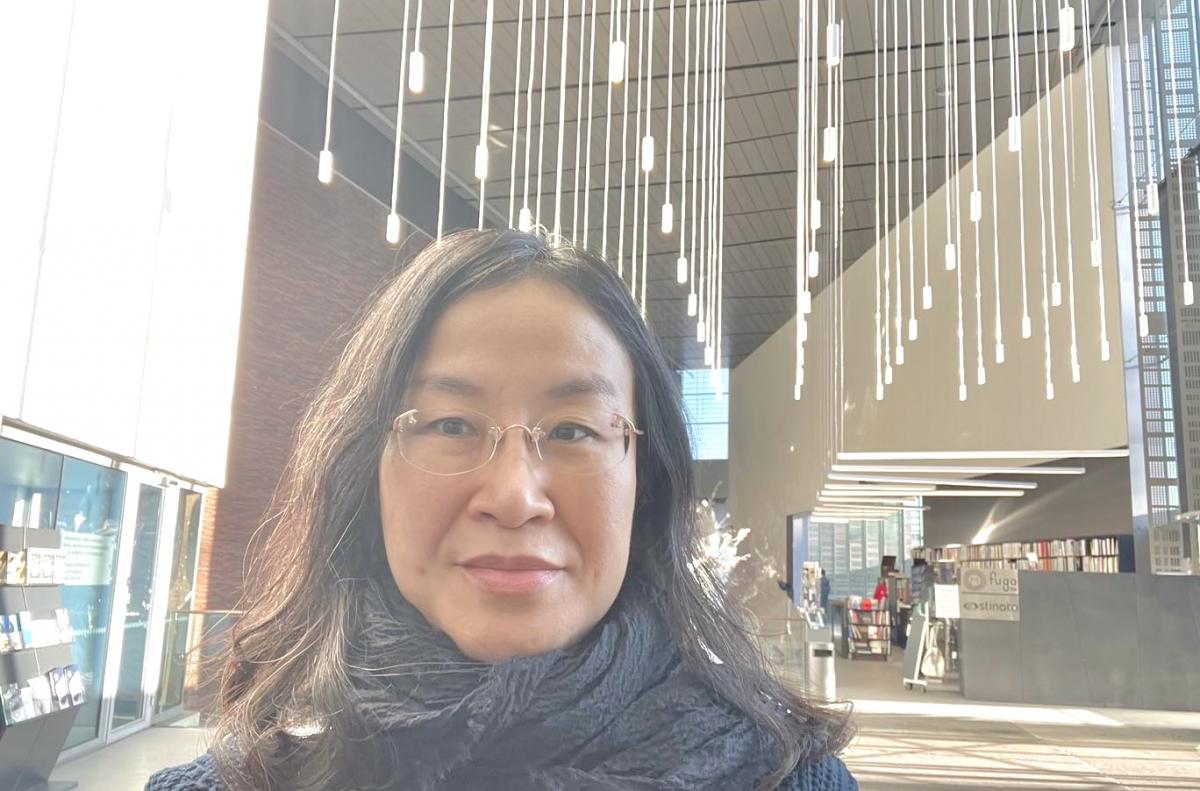Visiting professor Jin Hyun Kim: Arts studies offer plenty of possibilities to contribute to society
Jin Hyun Kim begun as the visiting professor of Music Technology at the Sibelius Academy in January 2023.

Get to know our most recent visiting professor, whose special interests include investigating the social impacts of music and the arts.
How would you summarize your research activities and/or interests in a couple of words – in your own words?
My research interests lie in basic music research combining philosophical reflections and empirical research, focusing on music technology, aisthesis, cognition, and interaction, and in methodological questions concerning artistic research, especially taking into account the first-person perspective as well as the second-person perspective.
How would you describe yourself as a teacher and as a researcher?
For me, a teacher at a university is someone who accompanies students as a senior fellow and whose role primarily consists in helping the students develop their own research questions and find appropriate methodological approaches to investigating those questions with artistic and scholarly means, all the while encouraging them to be curious and open-minded and to think critically. As a researcher, I embrace interdisciplinary approaches, am willing to be challenged by provoking thoughts, and am keen to debate.
What do you see is the main purpose of your post as a visiting professor at the Sibelius Academy?
As I see it, the main purpose of my post as a visiting professor is to strengthen exchanges between musicians/artists and music/art scholars from different disciplines at the three Uniarts academies, by highlighting the role of media technology that can be understood in a broad sense, discussing relevant basic questions concerning musical interaction, embodied music-making and the social impact of music, and contributing to the further development of methodological approaches to artistic music research.
What kind of a mark would you like to leave at the Sibelius Academy during your visitor professorship?
I hope to develop an approach to practice-centered and practice-accompanying artistic research in collaboration with students and colleagues, which might allow us to understand how creative musical processes emerge and unfold, tying in with the idea of Aktualgenese (microgenesis) and taking into account the dimensions of social interaction. I would be delighted if my students remembered how inspiring it was to engage in intense discussions with their fellow students and me and to develop a new perspective on their research topics. Over the past 15 years, I have visited several universities as an international visiting scholar. During my stay at Uniarts Helsinki, I intend to devote myself to methodological questions concerning artistic research, in collaboration with colleagues and students who are highly qualified for engaging with such questions.
What kind of a working or studying environment is the University of the Arts (and Sibelius Academy, and the Department of Technology) through your eyes at the moment?
It seems to me that the three Uniarts academies offer an innovative environment, integrating the departments and programmes that are devoted to contemporary artistic approaches, including the department of music technology and the master programme of live art and performance studies. The Research Institute of the University of the Arts Helsinki is a remarkable nexus that contributes to an interdisciplinary collaboration between the three Uniarts academies.
How do you see that one can deal with social issues through art and music?
Recently, I claimed that art and music are products of (basic and complex) social interaction that is rooted in early pre-linguistic forms of communication between an infant and its caregiver(s). Art and music do not only serve to reflect our society, but also render shaping forms of social dynamics using specific artistic and musical materials, making explicit certain social problems, such as those experienced by African-American women that are given shape by specific properties of Black voice and African-American musical traditions.
How do you see the role of university in preparing students to working life?
At university, students not only learn the skills that they need to master to be professional musicians, but also develop a new perspective on how music and the arts can contribute to a differentiated understanding of our contemporary society. They learn appropriate skills for professions that emerge through new technologies and that are needed for solving problems, e.g. current and future ecological and sociocultural problems. I think that finding a balance between practice-based skills for each musical profession and reflecting on the role of each profession is very important. The latter should also be cultivated through courses focusing on critical thinking and discussions.
Kim’s appointment is part of the International Visitor Programme of the Sibelius Academy, University of the Arts Helsinki. It complements the regular bachelor’s and master’s studies offered by the Sibelius Academy by inviting artists who represent the highest talent level of their respective fields to come and teach in Finland. The distinguished visiting artists work alongside students and teachers at the Sibelius Academy mainly in periods of one or two years at a time. The programme was realised for the first time in 2019.